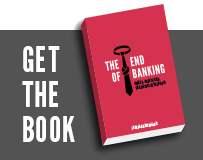The Story Behind the Idea
There are so many books about banking, why did you write another one?
A lot of books claim to explain the problems with banking, but most of them fail to reach the essence of the matter. Some authors interpret the financial crisis of 2007–08 as a story of greedy bankers scamming innocent widows and orphans. Scandalous stories can be entertaining to read, but identifying unchangeable aspects of human nature as the root of all evil falls short. It will not prevent the next financial crisis.
Neither will minor regulatory patches, which have been the standard answer to banking crises by many economists and politicians. The current problems with banking are deeply entrenched within the financial system. Fundamental change is needed, and some economists have indeed reverted to radical reform proposals that were originally developed decades ago.
However, while old theories have valuable lessons to teach, we found that old solutions fail to solve today’s problems with banking. Disappointed by the existing approaches toward banking and its problems, we decided to write The End of Banking.
Why did you choose this title?
The End of Banking is the result of careful deliberation, and we have chosen its title for a good reason. We found that banking was a sensible way to organize the financial system in the industrial age, but it got out of control with the rise of information technologies. The financial crisis of 2007–08 was an inevitable consequence of banking in the digital age.
Once the transformative potential of the digital revolution is understood, it becomes evident that banking is no longer an option. This is why the largest part of this book is concerned with outlining a financial system for the digital age that does not build upon banking – and it is why we called the book The End of Banking.
Who stands behind The End of Banking?

Jonathan McMillan is a pseudonym. Behind it stands an unlikely pair: a banker and an economist. The banker earned his B.A. and M.A. in economics from the University of St. Gallen and then began his career at a large global bank. Working in various roles out of Zurich, New York, and London, he gained deep insights into the inner workings of banking. Because of this author’s position, The End of Banking was published under a pseudonym.
The other author is Jürg Müller, an economist. He holds two B.A. degrees from the University of St. Gallen, an M.Phil. in economics from the University of Cambridge, and a Ph.D. from ETH Zurich. In his research, he investigated the impact of banking regulation on macroeconomic stability and welfare. Parts of his thesis were published in the Journal of Economic Theory.
After his doctoral studies, Jürg started as an economics editor at Neue Zürcher Zeitung, where he covered the financial sector. He later joined Avenir Suisse, Switzerland's largest think tank, as a senior fellow. In 2023, he was elected as the director of Avenir Suisse and became a lecturer at the economics faculty of the University of Zurich.
The authors came to know each other during their undergraduate studies. They lost touch in the years after due to their different career choices. In 2011, their paths crossed again in a London pub. Disappointed by how their peers in banking and academia handled the financial crisis of 2008, they decided to set forth on a writing journey together.
Neither of us has any political affiliations, and we are not tied by financial interests.




